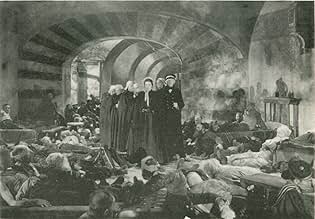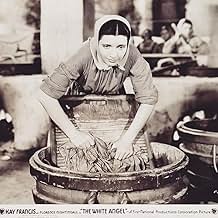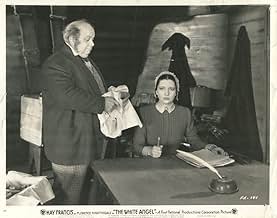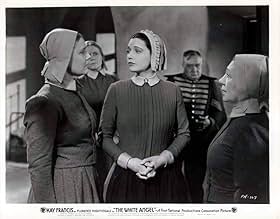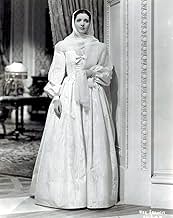IMDb RATING
6.6/10
445
YOUR RATING
A look at the life of Florence Nightingale.A look at the life of Florence Nightingale.A look at the life of Florence Nightingale.
- Awards
- 2 wins & 1 nomination total
Lillian Kemble-Cooper
- Parthenope 'Parthe' Nightingale
- (as Lillian Cooper)
Featured reviews
It's very melodramatic, reminding me of Young Tom Edison. Every "tidbit" the average person knows about the famous person is included in the script, in the most saccharine-style possible. Months after she sits up all night with Billy Mauch when he's ill, he finds her sitting in the snow. "I'm taking care of you now," he says as he gives her his coat. There are countless scenes like that one, as costars who play coworkers of Florence Nightingale praise her selflessness and dedication to her patients. In another scene, she comes down with cholera, and rather than letting the medical staff carry her away on a stretcher, the soldiers in the trench insist on doing it. That's fine, but one soldier actually says, "We'll do it! Who cares about cholera?" Way too corny for my taste.
But, if that's why you're watching the movie, you might not mind the style. I minded, because I was hoping for a more historical approach as to why she became a nurse, rather than just scene after scene of her forgoing sleep in order to sit up with a sick patient. There's a little portion of the beginning that shows her decline a marriage proposal in favor of medical school, but it's not very explanatory. There is a large supporting cast, though, including Henry O'Neill, Ian Hunter, Halliwell Hobbes, Nigel Bruce, Donald Crisp, Donald Woods, Fay Holden, and E. E. Clive. Watch at your own risk, and only if you like dated biopics.
But, if that's why you're watching the movie, you might not mind the style. I minded, because I was hoping for a more historical approach as to why she became a nurse, rather than just scene after scene of her forgoing sleep in order to sit up with a sick patient. There's a little portion of the beginning that shows her decline a marriage proposal in favor of medical school, but it's not very explanatory. There is a large supporting cast, though, including Henry O'Neill, Ian Hunter, Halliwell Hobbes, Nigel Bruce, Donald Crisp, Donald Woods, Fay Holden, and E. E. Clive. Watch at your own risk, and only if you like dated biopics.
The sharp, focused performance by Kay Francis carries this film into an impressive arena for its viewer. I've seen in several times and although Francis doesn't go into histrionics in her portrayal like some of the "greats" would -- Francis exemplifies the determination, courage, and humaness of one who "feels a calling". She never wavers in what she is about, frustrated but not discouraged, and Francis' subtlety emphasises these qualities. The beginning of the film offers Francis a chance to don the elegant gowns of the mid 1800's, but most of the film she's wearing a plain nurse's uniform and often looking quite drawn from the conflicts with male prejudice on the Crimean front and the squalid conditions that she faced in all directions. I don't know how historically accurate the film is, but it gets to the heart of the Nightingale story and what she was up against. Strong support from players like Donald Crisp and Ian Hunter add to the overall success.
I come from a family of nurses, so I watched this film with interest.
Kay Francis plays Florence Nightingale, the founder of modern nursing. Mostly the film covers her work in the Crimea.
This is a typical '30s movie - Nightingale meets with a great deal of resistance, which she probably did in real life. The villains here are somewhat cliched in their nastiness and refusal to help her make any progress. A typical good vs. Evil fight.
I read a lot of criticism about Kay Francis - this was an unusual role for her, where she's not playing a woman of the world. I thought she portrayed a quiet strength and dignity.
Someone said Bette Davis would have been better. Bette Davis was wonderful, but I didn't feel Nightingale needed a fiery portrayal. As far as criticism of Francis, Francis' interpretation was correct in that she was well-educated and came from a wealthy family.
Granted she's portrayed as a saint, but that's the fault of the script. I do believe that Nightingale, given her upbringing, was a strong and determined woman who used a velvet glove rather than an iron hand.
I found the film very absorbing and poignant.
Kay Francis plays Florence Nightingale, the founder of modern nursing. Mostly the film covers her work in the Crimea.
This is a typical '30s movie - Nightingale meets with a great deal of resistance, which she probably did in real life. The villains here are somewhat cliched in their nastiness and refusal to help her make any progress. A typical good vs. Evil fight.
I read a lot of criticism about Kay Francis - this was an unusual role for her, where she's not playing a woman of the world. I thought she portrayed a quiet strength and dignity.
Someone said Bette Davis would have been better. Bette Davis was wonderful, but I didn't feel Nightingale needed a fiery portrayal. As far as criticism of Francis, Francis' interpretation was correct in that she was well-educated and came from a wealthy family.
Granted she's portrayed as a saint, but that's the fault of the script. I do believe that Nightingale, given her upbringing, was a strong and determined woman who used a velvet glove rather than an iron hand.
I found the film very absorbing and poignant.
The White Angel which was a film about the crucial years in the life of Florence
Nightingale when she during the Crimean War popularized the career of nursing
for women and sanitary hospitals. Her work in Great Britain and Clara Barton in
the USA during the Civil War set the standards for the nursing profession as we
know it now.
Nightingale came from an upper class background and that probably stood her in good stead because someone who had to worry about how the next month's rent was to be paid or the next meal coming from could not have taken on what she did or faced down the sexist attitudes of her age.
The British cinema did the best version of her life in 1951 with Anna Neagle playing Nightingale. Besides Florence herself the real name of only one other character is used, that of Lord Raglan the Commander of the British forces in the Crimea played here by Halliwell Hobbes. The real players are used in the Neagle film.
This was a change of pace for Kay Francis who usually was more glamorous in her roles than here. Francis reminds me a lot of Rosaland Russell when she did Sister Kenny.
This was part of Warner Brothers biographical films of the late 30s and The White Angel was the only one to have a female subject. The White Angel bogs down a bit in spots and for a more accurate film the Neagle picture is better. Still this is reasonably entertaining and Kay Francis fans will like it.
Nightingale came from an upper class background and that probably stood her in good stead because someone who had to worry about how the next month's rent was to be paid or the next meal coming from could not have taken on what she did or faced down the sexist attitudes of her age.
The British cinema did the best version of her life in 1951 with Anna Neagle playing Nightingale. Besides Florence herself the real name of only one other character is used, that of Lord Raglan the Commander of the British forces in the Crimea played here by Halliwell Hobbes. The real players are used in the Neagle film.
This was a change of pace for Kay Francis who usually was more glamorous in her roles than here. Francis reminds me a lot of Rosaland Russell when she did Sister Kenny.
This was part of Warner Brothers biographical films of the late 30s and The White Angel was the only one to have a female subject. The White Angel bogs down a bit in spots and for a more accurate film the Neagle picture is better. Still this is reasonably entertaining and Kay Francis fans will like it.
In the grand tradition of biography pictures that sanctify their subjects comes "The White Angel," the "true" story of the lady with the lamp, the nurse who revolutionized nursing, Miss Florence Nightingale. Why does Hollywood insist on sanitizing and sweetening the lives of real people? The most blatant example of this is probably "Private Parts"- the life story of Howard Stern- which turns America's favorite sexually-stunted shock-jock bully into a misunderstood merry prankster, a teddy bear of a man fighting the good fight against prudes and censors. Right.
I caught "The White Angel" on TCM late one evening. It begins with Florence Nightingale- "Flo" to her contemporaries- rejecting tradition and refusing to marry and settle down. She senses a greater purpose and a place for women in military medicine. [In actuality Florence and her sister were encouraged to pursue education by their forward-thinking father.] As played by Kay Francis, Ms. Nightingale is a humorless, passionless saint with absolute confidence in her methods and philosophy. Kay plays the role as if she's riding a heroin high- deeply centered and somewhat removed. With the success of the film riding on this lead performance, we're left with a fascinatingly anti-climactic picture.
There is little if any dramatic conflict in the film- it has all the suspense of a book report. The encounters between Florence and other characters are all laughably wooden. Her antagonists openly profess their resentment of her to her face and she sits stoic, with eyes-wide, accepting the abuse and calmly declaring her intentions to proceed. In one particularly action-less sequence, Florence and her nurses storm the supply tent after the clerk tells them it's closed. "Does the war close at seven?" Florence asks, "Do they stop bringing in the wounded at seven?"
Before the bureaucrat gets the chance to answer, Florence has delicately and glamorously stepped past him, forcing her way inside with the help of the other nurses.
That's the most exciting moment in the movie.
Henry Wadsworth Longfellow stops by to gawk at her heroism and write the poem that would immortalize her. Crusty wounded soldiers smile at her tenderness as she walks the hospital halls at night checking on her patients. I had trouble keeping mine.
The story seems SO glossed-over and tidy (even for a biopic of the 30's) that one can't help but feel cheated by fabricated elements as well as the absence of significant actual events. When Florence arrives at the military hospital a soldier informs her that 57% of all wounded men die even under medical care... the trouble is we're never given an updated number as to a soldier's chance of survival. This is especially ironic due to the fact that a)Florence's Nightingale's arrival and improvement of the military medical system surely improved the survival rate and b) Nightingale herself was famous for her statistical analysis and record-keeping of mortality rates and other social phenomenas. Disappointing.
The film is ultimately a waste; it is predictable and pre-digested, not even diverting enough to hold my attention. Who knew changing the world could be so boring?
Grade: C
I caught "The White Angel" on TCM late one evening. It begins with Florence Nightingale- "Flo" to her contemporaries- rejecting tradition and refusing to marry and settle down. She senses a greater purpose and a place for women in military medicine. [In actuality Florence and her sister were encouraged to pursue education by their forward-thinking father.] As played by Kay Francis, Ms. Nightingale is a humorless, passionless saint with absolute confidence in her methods and philosophy. Kay plays the role as if she's riding a heroin high- deeply centered and somewhat removed. With the success of the film riding on this lead performance, we're left with a fascinatingly anti-climactic picture.
There is little if any dramatic conflict in the film- it has all the suspense of a book report. The encounters between Florence and other characters are all laughably wooden. Her antagonists openly profess their resentment of her to her face and she sits stoic, with eyes-wide, accepting the abuse and calmly declaring her intentions to proceed. In one particularly action-less sequence, Florence and her nurses storm the supply tent after the clerk tells them it's closed. "Does the war close at seven?" Florence asks, "Do they stop bringing in the wounded at seven?"
Before the bureaucrat gets the chance to answer, Florence has delicately and glamorously stepped past him, forcing her way inside with the help of the other nurses.
That's the most exciting moment in the movie.
Henry Wadsworth Longfellow stops by to gawk at her heroism and write the poem that would immortalize her. Crusty wounded soldiers smile at her tenderness as she walks the hospital halls at night checking on her patients. I had trouble keeping mine.
The story seems SO glossed-over and tidy (even for a biopic of the 30's) that one can't help but feel cheated by fabricated elements as well as the absence of significant actual events. When Florence arrives at the military hospital a soldier informs her that 57% of all wounded men die even under medical care... the trouble is we're never given an updated number as to a soldier's chance of survival. This is especially ironic due to the fact that a)Florence's Nightingale's arrival and improvement of the military medical system surely improved the survival rate and b) Nightingale herself was famous for her statistical analysis and record-keeping of mortality rates and other social phenomenas. Disappointing.
The film is ultimately a waste; it is predictable and pre-digested, not even diverting enough to hold my attention. Who knew changing the world could be so boring?
Grade: C
Did you know
- TriviaMuch disagreement to the origin of the source material exists. Some contemporary sources believed the source was Lytton Strachey's 1918 biographical essay in "Eminent Victorians". Others contend Michael Jacoby was the author. Warner Bros. executive Hal B. Wallis contended that the life of Florence Nightingale was in the public domain, and that screenwriter Mordaunt Shairp did his own research. The MPAA agreed with Wallis; no source credit was necessary.
- GoofsWhen Florence is receiving the news on the steps of the hospital of the sinking of the French transport, the shadow of the boom microphone moves onto then quickly off her left sleeve.
- Crazy creditsPrologue: Towards the year 1850, England was at peace with the world. Her men were following her ships to the four corners of the earth, building the great empire that is Queen Victoria's monument. Women were only permitted to nod meek approval. In all England, only Her Majesty had the right to express herself with the independence of a man.
- ConnectionsFeatured in Breakdowns of 1936 (1936)
- SoundtracksAuld Lang Syne
(uncredited)
Traditional
Lyrics by Robert Burns
Incorporated into the score at the new year
Sung by the crowd celebrating the new year
Details
- Release date
- Country of origin
- Language
- Also known as
- The White Angel
- Filming locations
- Production companies
- See more company credits at IMDbPro
- Runtime
- 1h 32m(92 min)
- Color
- Sound mix
- Aspect ratio
- 1.37 : 1
Contribute to this page
Suggest an edit or add missing content



